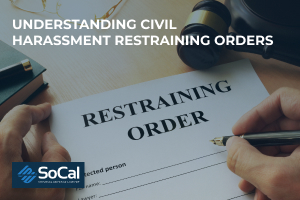
Dealing with a civil harassment restraining order (CHRO) in San Bernardino can be a stressful experience. Understanding the legal process is crucial whether you're seeking protection or defending against a CHRO. It's a situation that not only involves complex legal procedures but also deeply personal matters. That's why having an experienced San Bernardino CHRO attorney is essential.
At SoCal Criminal Defense Lawyer, we understand that a San Bernardino restraining order, such as a workplace violence restraining order or a permanent restraining order, can hinder your life. As a restrained person, you might not be allowed within a certain distance of the protected person, which makes it hard to go to work, school, or run errands. Our law offices have experience with restraining orders, court forms, and the California courts. Contact us to schedule a consultation.

Having a knowledgeable attorney is invaluable when you're involved in a CHRO case. An experienced CHRO attorney in San Bernardino understands the nuances of these cases. They can guide you through legal complexities and protect your rights. Their expertise can be the deciding factor in the success of your case.
Choosing the right attorney means finding someone who's not only well-versed in the law but also sensitive to your situation. An excellent attorney will pay attention to your narrative. He will assess your case and develop a strategy tailored to your needs. They'll represent you in court, communicate with all parties involved, and work tirelessly to achieve the best possible outcome.
Reach out to us today to make sure your rights are protected. We will make sure that we fight against any unfair restraining orders.

A civil harassment restraining order is a court order that protects individuals from being harassed, stalked, or threatened. In San Bernardino, these orders are taken seriously and are enforced strictly. Understanding what constitutes civil harassment and how the legal system handles these cases is important for anyone involved. We will fight to ensure a fair trial.
Civil harassment involves repeated, unwanted behavior that alarms, annoys, or terrorizes a person. This can include stalking, threats, or any behavior that causes reasonable fear for one's safety. Understanding this definition is crucial for both the petitioner seeking protection and the respondent facing the order.
Civil harassment differs from other forms of harassment in its nature and the relationship between the involved parties. It typically occurs between individuals who aren't closely related, like neighbors or acquaintances. Recognizing the behaviors that constitute civil harassment is key in these cases. We will examine the nature of the accusations against you. This is important for forming the strongest possible defense.
To obtain a CHRO in San Bernardino, the petitioner must demonstrate that they have been a victim of harassment as defined by the law. This involves presenting clear and convincing evidence of the harassing behavior. The court will take into account the frequency and severity of the actions when making a decision.
The petitioner must also show that they feel afraid, harassed, or distressed by the respondent's behavior. This subjective feeling needs objective evidence to support it. Meeting these criteria is essential for the court to grant a CHRO. If the accuser has not met these requirements, we can fight to have the CHRO tossed out.
Behaviors leading to a CHRO can vary widely. They often include stalking, repeated unwanted contact, threats of harm, or any actions that cause significant distress. Understanding what behaviors can result in a CHRO is important for both petitioners and respondents.
These behaviors don't always have to be physical. They can also be verbal or written, like threatening messages or emails. Recognizing these actions and how they impact the individuals involved is crucial in CHRO cases. This is the foundation of our defense.
CHROs differ from other types of restraining orders like domestic violence restraining orders or workplace violence restraining orders. Each type serves a different purpose and applies to different relationships and circumstances. Understanding these distinctions helps in determining the appropriate legal action to take.
For example, a domestic violence restraining order applies to close relationships, like family members or intimate partners. CHROs, however, are typically for relationships outside of these categories. Knowing which type of order applies to your situation is crucial for effective legal action.

The legal process for CHRO cases in San Bernardino involves several steps. Understanding each phase helps you prepare and respond effectively. It's essential to approach each step with a suitable legal strategy to protect your rights and interests.
Filing a CHRO petition requires completing specific legal forms and providing evidence of harassment. The court then reviews your petition and decides whether to issue a temporary restraining order. This process demands attention to detail and a clear presentation of the facts.
Once a CHRO is issued, the papers must be formally served to the respondent. This process involves delivering the legal documents in a manner prescribed by law. Proper service ensures the respondent is officially notified and the legal process can proceed.
If you're the respondent, it's essential to understand your rights and responsibilities. You have the right to contest the CHRO in a court hearing. Responding appropriately to the CHRO, including adhering to its terms and attending court hearings, is critical. We will help you figure out the best way to respond to the allegations.
The initial court hearings are where the judge hears both sides of the case. Legal representation is essential during these hearings. An attorney can advocate for your case, argue on your behalf, and work to protect your rights. This representation is vital, whether you're the petitioner or the respondent.
A. Gathering Evidence To Refute Allegations. Collecting evidence is critical in defending against a CHRO. This includes any communication records, witness statements, or other materials that refute the allegations. Presenting strong evidence can challenge the petitioner's claims and support your defense.
B. Interviewing Witnesses and Obtaining Statements. Witnesses can provide crucial insights into the situation. Their statements can corroborate your account of events or challenge the petitioner's narrative. It's essential to identify and interview relevant witnesses to strengthen your defense.
C. Cross-Examining the Petitioner's Evidence. Cross-examining the petitioner's evidence in court can reveal inconsistencies or weaknesses in their case. A skilled attorney can use this technique to challenge the credibility of the evidence presented against you. This is a critical part of the defense strategy.
D. Presenting a Compelling Case in Court. In court, it's essential to present a compelling and coherent defense. This involves clearly articulating your arguments, presenting evidence effectively, and responding to the petitioner's claims. A strong court presentation can significantly influence the outcome of your case.
Working effectively with law enforcement and the court is crucial in CHRO cases. It's essential to understand their roles and procedures. Maintaining a cooperative and respectful relationship with these entities can benefit your case.
In cases involving law enforcement, it's vital to comply with their requests and instructions. However, knowing your rights and not incriminating yourself are important. An attorney can guide you in these interactions, protecting your rights. Let us help you manage your relationship with law enforcement.
After the trial, there are options for appeals and post-trial relief if you're not satisfied with the outcome. Understanding the grounds for appeal and the process is essential. This includes identifying any legal errors that occurred during the trial.
Filing an appeal requires following specific procedures and deadlines. It's a complex process that demands a comprehensive understanding of appellate law. If this works, an appeal can lead to a new trial or a different outcome.
Defending against a CHRO in San Bernardino requires a strategic approach. Knowing the common defenses can help you prepare your case effectively. Each defense must be tailored to the specific circumstances of your case.
A defense of a lack of credible evidence focuses on undermining the reliability of the petitioner's claims. This strategy involves questioning the validity of any evidence presented against you. This could be physical, testimonial, or circumstantial evidence. An effective defense lawyer will scrutinize the evidence for inconsistencies or weaknesses. Then, they will challenge its admissibility in court. Demonstrating that the evidence is flawed can weaken the petitioner's case. This will work in your favor.
Defending against false accusations involves proving that the allegations made in the CHRO are unfounded. This defense strategy can be crucial. This is particularly true in cases where the accusations are motivated by personal vendettas. Demonstrating the baselessness of the claims often involves gathering and presenting evidence that contradicts the petitioner's story. Successfully proving false accusations can lead to the dismissal of the CHRO and legal repercussions for the petitioner.
Arguing constitutional rights violations is a potent defense in CHRO cases. This strategy involves demonstrating that your fundamental rights were infringed upon. These could include freedom of speech or due process. Successfully proving such violations can convince the court that the restraining order is illegal. This defense requires a deep understanding of constitutional law.
Challenging the petitioner's motives is an effective defense in CHRO cases. This is especially true when there are ulterior motives behind the filing. This defense strategy focuses on uncovering the real reasons behind the petitioner's actions. This might include personal grudges or attempts to gain leverage in other legal matters. By exposing these motives, your attorney can question the integrity of the petitioner's claims.
This approach often requires investigative work to gather evidence. This evidence can reveal the petitioner's true intentions. This might include witness testimonies, past interactions, or evidence of the petitioner's behavior in related circumstances. Demonstrating that the CHRO is being used as a tool for personal gain or revenge can be a powerful defense. This could potentially lead to the dismissal of the order.

When you are facing a civil harassment restraining order in San Bernardino, it's important to have the right legal representation. Our team at SoCal Criminal Defense Lawyer has the experience and knowledge to guide you through this process.
If you're facing a civil harassment restraining order case, don't hesitate to reach out for legal assistance. Contact SoCal Criminal Defense Lawyer today for a free consultation. We'll review your case, discuss your options, and help you navigate the legal challenges ahead. Call us now and take the first step towards resolving your legal issues.
Schedule Your Free
Confidential Consultation


Follow Us
"*" indicates required fields